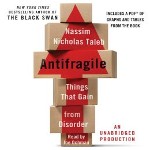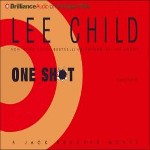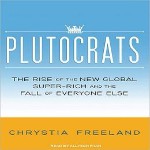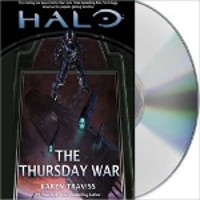AUDIO BOOK REVIEWS
by Jonathan Lowe
 |
Smart,
unethical manipulators get rich by fooling Joe Sixpack,
and expecting him to be a sucker or a lemming, according
to the new book ANTIFRAGILE.
Author Nassim Nicholas Taleb ("The
Black Swan") makes the point that bigger is NOT better
when it comes to Wall Street banks, or big companies like
Coke and Pepsi, although the mass media have fooled us into
believing such, and partly because they are big and want
to retain their monopoly at your expense. Taleb shows that
when things get squeezed, costs rise exponentially, not
linearly. And this is the fundamental error made by forecasters,
political pundits, politicians, economists, military strategists,
and everyone else who thinks tomorrow will (or should) repeat
today. Taleb says that we are wasting time and money because
we confuse catalysts with causes, and don't realize that
individual actions cannot be predicted at all. "It
is like blaming a bridge collapse on the last truck that
passed over it," he says. For all our talk of security,
we squander our time and effort by imagining we can somehow
predict the "black swan" event---be that an economic
collapse, an uprising in the Middle East, or a guy with
a gun in a school. These things, by their very nature, are
unpredictable. Black swans hide within all complex systems,
and there is no simple program which can fish them out,
especially if you're looking at surface tensions and don't
delve deeper. Throw all the money you like at "military
intelligence" and you get what we've gotten: not much
at all. So Taleb is not a fan of interventionism, either.
Like muscles, people only grow through adversity, not by
hiring bodyguards and manicurists. To become more than just
resilient (to not simply survive but to thrive), he shows,
requires eyes-wide-open, and the imagination to create new
ideas based on a willingness to change, and a passion to
grow from mistakes. The book itself is a learning experience,
as it embraces trial and error, personal risk, and new ethical
choices. "If you see fraud and don't say fraud, you
are a fraud," Taleb insists. Insightful and revolutionary. |
|
 |
Jack
Reacher ONE SHOT by Lee Child was published
in 2005, and has now come to the screen, starring Tom Cruise.
It starts with a shooter whose five dead bodies point to
a military sniper as perp. But then the man says they've
got the wrong man, and asks for Jack Reacher's help. Reacher
is an ex military investigator, a loner who now takes only
those cases that intrigue him or in which he feels that
his particular skills can produce results that the police
may not be able to achieve. Reacher is a fighter, a sharpshooter,
a enigma driven by inward demons. This makes him a kind
of mythic anti-hero, but not one who seeks outward rewards.
In fact, Reacher likes being out of the spotlight, and is
very hard to find. (This may be the key to Cruise wanting
the role, too: forever in the spotlight, Tom is attracted
to playing someone who avoids it at all cost.) Narrator
for the Child series is Dick Hill, who nails the
character and adds much local color to minor characters.
I've talked to Hill in the past, and predict you'll enjoy
this, regardless of whether it's before or after you see
the movie version. If you like this, be sure to hear Hill
read "24 Hours" by Greg Iles, one of the best
audiobooks I've ever heard (although not available at Audible.)
The emotions he evokes in dialogue there comes from years
of reading between the lines of the text to interpret motivations.
Not an easy task, and requiring careful reading, re-reading,
and notes on where to muscle the tone, and how to foreshadow
the blueprint that is the story's arc. |
|
 |
BLOOD
DIAMONDS by Ed Lynskey is a pulp crime thriller
told from the point of view of a sociopathic grifter named
Jonas Blades, whose weakness for women nearly does him in.
The plot revolves around a diamond heist double-cross in
which Jonas betrays the lover whose idea it was, then takes
up with another as she rots in prison. As the story begins,
his first "mistake" gets out of jail and comes
around for revenge, along with the diamonds Blades has been
hiding in a safety deposit box. It's a fun romp, full of
names you might find in a Woody Allen flick, like "Jacquie
Mantooth" and "Virgil Hogman" and "Rita
Jo Chapelle." Much of the mid-book is an extended flashback
to the actual crime. The term "blood diamonds"
here is not so much a reference to their origin in Africa
attained by slave labor, but rather the fact that the hot
rocks only go to one victor of the four vying for them,
with murder (and blood) the means to arrive there. Narrator
Phil Berroll acquits himself nicely with the first
person story, his gruff voice standing in for Blades, and
unafraid to embarrass himself (in the character's lustful
ignorance of women.) Not much is needed in the way of melodrama
in dialogue, since this guy is like an anti-Mike Hammer
in telling his twisted tale, with a neat little twist at
the end showing just how "set" the criminal mind
is in making another victim or sap pay for their mistakes.
|
|
 |
One
of the reasons many wring their hands and turn on that boob
tube is due to believing past opportunities have gone forever,
thanks in part to increasing inequity of the playing field
leveraged by the super rich, as outlined in PLUTOCRATS
by Chrystia Freeland. Her subtitled is "The
Rise of the New Global Super-Rich and the Fall of Everyone
Else." China is also examined, with the revelation
that the richest members of their National People's Congress
dwarfs what Romney has, while they sit on a massive national
surplus instead of a national debt. This is a global story,
not just an American one, but here the plutocrats influence
both our political parties, and were behind the banking
deregulation that led to the near collapse of the middle
class, after which they alone rebounded. According to Freeland,
it is not the top 1% that benefit most today, but the top
.1% (over the bottom 99.9%.) The most wealth is going into
ever fewer and fewer hands. Wherever they live, modern day
robber barrons see themselves as global empire builders
whose goal is to acquire power and influence while dodging
taxation through numbered offshore accounts. Everyone knows
the shenanigans that went on at Goldman Sachs and AIG before
and after the 2008 collapse, but Freeland also reveals an
internal memo at Citigroup which advised brokers to design
portfolios around "international plutonomy" with
the same reasoning that Russian oligarchs used to nationalize
and acquire private land: the philosophy that the super
rich can write their own rules--above the law--and that
they deserve special praise and advantage for having acquired
what they possess. The truth, of course, is that no one
really "owns" anything, we're all just renting.
(Remember Ozymandias?) Opportunity still exists to those
who have the vision to see past obstacles and to use their
imagination to find new solutions. Plutocrats
is read on audio by Allyson Ryan.
|
|
 |
HALO--The
Thursday War offers up a sequel to the first
episode of the Kilo Five Trilogy by Karen Traviss,
in which a black ops team tries to prevent a military regrouping
by the Covenant Elites while rescuing a fighter from behind
enemy lines. This military sci-fi novel, based on the X-Box
game, has all the earmarks of real war, including terrorism,
revenge, betrayal, and special operations tactics. Who's right,
the humans or the aliens? Well, if you're human you're "supposed
to" believe we are. Just like both sides in the Arab/Israeli
conflict claim the other side is evil, albeit one side is
more obviously playing defense against an offense that claims
defense. Of course in the world of space opera, the question
of "right and wrong" is either "black or white"
(expanded racism to the stars) or it's totally relative and
so never asked. For example, here one character says, "Asking
about morality is a waste of time, better to figure out how
to get away." As an aside, wouldn't it be great if an
alien being, even more advanced than the Forerunners, could
just step in and organize a friendly game of checkers to determine
policies and truces? Boring, perhaps, unless you're the one
to be sliced and diced otherwise. A very different literary
branch of science fiction attempts to postulate how society
itself might change with the progress of ideas, with the premise
that human evolution is not complete, albeit it moves on a
slower path than the 26th Century here might provide (if we
survive.) Anyway, The Thursday War is narrated by
actor Euan Morton, whose narration style evokes what
Star Wars characters do at times, (if in an obviously more
complex setting.) Tone is as grim as it needs to be in places,
and with Earth accents such as Scottish in the case of Phillip.
If you're a fan of the game, it definitely provides much backstory
as an entertaining saga, and in a similar manner as do the
Star Wars based novels (albeit without their melodramatic
sound effects.) |
|